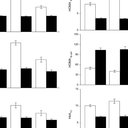Oat-derived beta-glucan significantly improves HDLC and diminishes LDLC and non-HDL cholesterol in overweight individuals with mild hypercholesterolemia.
Cuvinte cheie
Abstract
OBJECTIVE
To investigate the effect of bread formulated with 6 g of beta-glucan (oat soluble fiber) on serum lipids in overweight normotensive subjects with mild to moderate hypercholesterolemia.
METHODS
Thirty-eight male subjects [mean age 59.8 +/- 0.6 yr, mean body mass index (BMI) 28.3 +/- 0.6 kg/m(2)] who were eligible for the study ate an isocaloric diet for a 1-week period. They were then divided into 2 groups: group A (n = 19), who were maintained on American Heart Association (AHA) Step II diet, including whole wheat bread, and group B (n = 19), who were maintained on AHA Step II diet containing high levels of monounsaturated fatty acids plus bread containing 6 g of beta-glucan (Nutrim-OB) for 8 weeks. Plasma lipids and glucose were measured at baseline and after weeks 8 in all subjects. All subjects were advised to walk for 60 minutes every day.
RESULTS
There was a significant increase (upward arrow 27.8%) in plasma high density lipoprotein (HDL) cholesterol in the beta-glucan group (group A) from 39.4 +/- 2.0 to 49.5 +/- 2.1 mg/dL (P < 0.001), but there was no change in group B. There was a significant reduction in total cholesterol in the 2 groups to approximately the same extent: group A, from 232.8 +/- 2.7 mg/dL to 202.7 +/- 6.7 mg/dL; P < 0.001; and group B, from 231.8 +/- 4.3 mg/dL to 194.2 +/- 4.3 mg dL; P < 0.001. Plasma low density lipoprotein (LDL) cholesterol also decreased significantly in the two groups: group A, from 160.3 +/- 2.8 mg/dL to 133.2 +/- 5.4 mg/dL; P < 0.001; group B, from 167.9 +/- 4.3 mg/dL to 120.9 +/- 4.3 mg/dL; P < 0.001; however, the beta-glucan fortified diet was significantly more effective (downward arrow 27.3% vs. downward arrow 16.8%; P < 0.04). There was a small and insignificant reduction in plasma very LDL (VLDL) cholesterol and triglycerides in the two groups. Similarly, non-HDL cholesterol levels were also decreased, with beta-glucan diet producing significantly higher effect (downward arrow 24.5% vs. downward arrow 16.1%; P < 0.04). The beta-glucan diet also produced higher reduction in total cholesterol/HDL cholesterol ratio (downward arrow 33.3% vs. downward arrow 8.4%; P < 0.003) and LDL cholesterol/HDL cholesterol ratio (downward arrow 42.1% vs. downward arrow 13.3%; P < 0.001) than the diet without beta-glucan. The beta-glucan diet also decreased fasting plasma glucose (P < 0.4), whereas the other diet had no effect. Interestingly, both diets reduced body weight and BMI significantly, with beta-glucan diet having a greater effect.
CONCLUSIONS
Six grams of beta-glucan from oats added to the AHA Step II diet and moderate physical activity improved lipid profile and caused a decrease in weight and, thus, reduced the risk of cardiovascular events in overweight male individuals with mild to moderate hypercholesterolemia. The diet with added beta-glucan was well accepted and tolerated.


